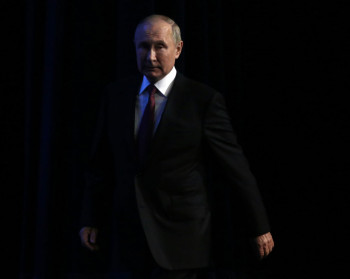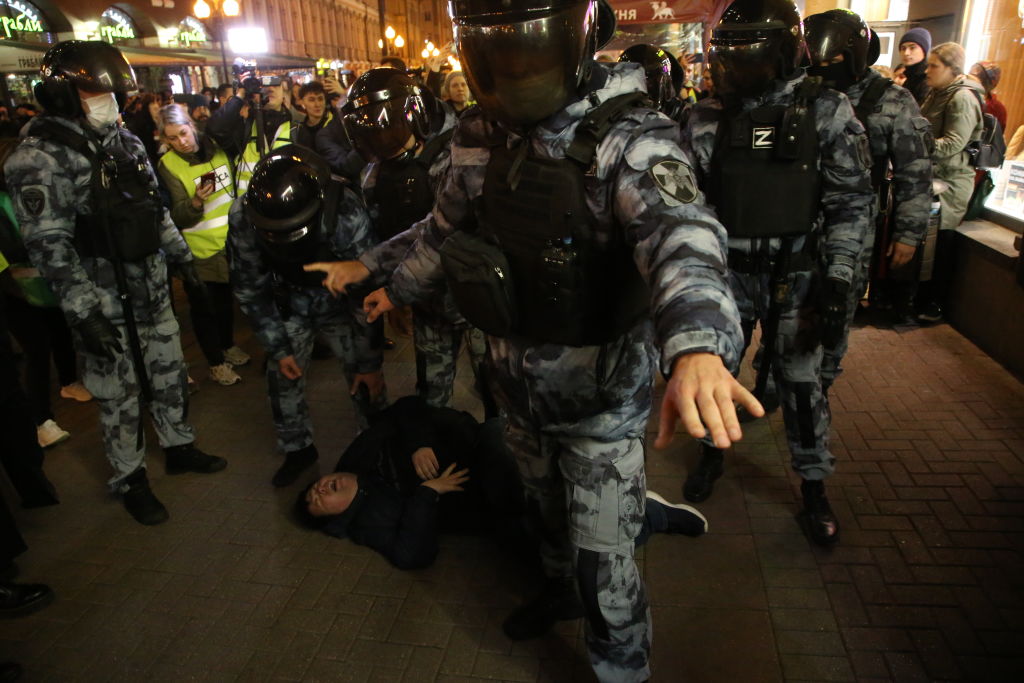For many Ukrainians, watching queues of conscription-age Russians fleeing the specter of mobilization has proven bittersweet. Each body that crosses the border into Kazakhstan, Armenia, or Georgia is one less soldier to occupy Ukrainian soil.
But why have the same crowds failed to appear at anti-war protests in a bid to topple Russian President Vladimir Putin’s regime?
The most immediate answer is the uncompromising force with which Russia’s security forces have targeted dissenters.
Russia’s anti-war opposition was most vocal in the days immediately after the invasion in February, and then in late September when the Kremlin declared a “partial mobilization” to bolster the war effort.
On both occasions, riot police met protesters with violence. In the first 10 days of the full-scale invasion, Russian police watchdog OVD-Info reported that some 13,000 people had been arrested at anti-war rallies across 147 Russian cities, with protesters reporting beatings at the hands of the police.
Since then, hundreds more have been arrested and jailed, and some sentenced to several years in prison, for “discrediting” the Russian Armed Forces or spreading “fake news” about Putin’s so-called “special military operation.” This violence has forcibly stopped opposition organizers from working and prompted many who are against the war to stay at home.
“(The security services) have moved on to tactics of intimidation,” says one spokeswoman from Russia’s Feminist Anti-War Resistance, a protest group organized entirely through Telegram. In a bid to ensure that the group can survive state repression, the movement is entirely decentralized. There is no set leadership and anyone who shares the coalition’s values can join.
“Even before a rally begins, they go from house to house, break down doors, conduct searches, arrest people, put them in hospital,” she says. “There have been so many of them.”
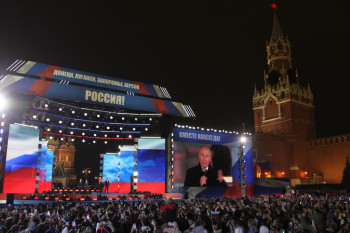
But even this explanation leaves questions unanswered.
Anti-war Russians who take to the streets face torture, rape, and assault, but they are not the only nation subjected to such authoritarian tactics. Belarusian protesters were subjected to similar treatment when they flooded the streets in 2020 in an attempt to depose dictator Alexander Lukashenko. While the uprising ultimately failed, the violence did not deter the hundreds of thousands of Belarusians from making a desperate stand.
In Russia, those same numbers have simply failed to materialize.
According to the Kremlin-controlled pollsters, over 80% of Russians support Putin, while more than half of the country's residents support their country's war against Ukraine.
While the numbers are impossible to verify independently, the lack of vocal dissent has raised the question – are they that far from the truth?
Divided and despairing
Russia’s opposition has been continually weakened over the past two decades, as political organizations and parties have been outlawed and forced into exile. But even before political repression began in earnest in 2014, the opposition found itself fractured into distinct factions and camps.
“I would say that the Russian opposition is very atomized, and I think it’s been like that forever,” says Maria Gunko, a DPhil student in Migration Studies at Oxford University’s Centre for Migration, Policy and Society. “In Russia generally, people's values and worldviews differ greatly between classes, ages groups, and also geographically — between capitals and smaller cities and rural areas.”
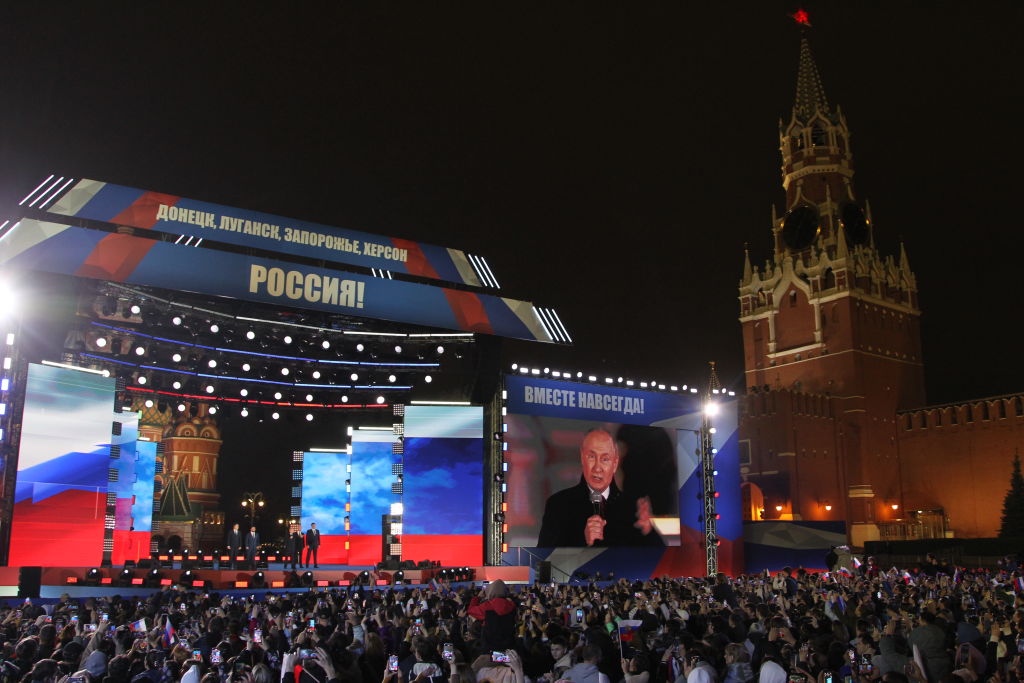
Russian President Vladimir Putin speaks during a rally at the Red Square, in Moscow, in support of the illegal annexation of four Ukrainian regions, on Sept. 30, 2022, (Getty Images)
This lack of unity across all strata of Russian society has affected the opposition’s ability to organize and draw large crowds.
“People in Moscow and St. Petersburg will take to the streets for certain values such as freedom of speech and democracy, but that’s not really on the agenda in the same way elsewhere,” says Gunko. “Outside of Russia, there’s this narrative that (jailed Russian anti-corruption campaigner Alexey) Navalny is the head of the Russian opposition but that’s not the case. He unites quite a small, specific part of Russian society.”
When Russians — especially those living away from major cities — do take to the streets, it is usually certain segments of society who wish to protest an issue that specifically touches their lives or livelihoods, typically “not in my backyard”-style issues, says Gunko.
She characterizes this as a symptom of a larger, unspoken social contract that has dominated Russia since the fall of the Soviet Union: the idea that the Russian people will leave the state unimpeded as long as the government doesn’t overtake the private realm.
“There is sort of a social contract in Russia where the elites in power can do whatever they want as long as they don’t interfere in people’s private lives,” says Gunko. “Sure, the state is over there doing this and that, but in their own private space, people are quite free. That’s why we are seeing more protests concerning mobilization than the war itself — because it’s an issue which interferes in that private life.”
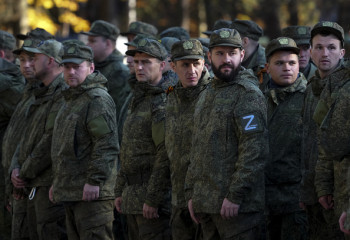
Many Russian oppositionists say that the war has forced separate groups to look past their differences and promoted greater information sharing among activists.
“You still have a number of left-wing groups like the Russian socialist movement, socialist alternative who exist in a very hidden way. Many activists have already left the country. But some members of these groups were still active during the protests,” says Ilya Budraitskis, a historian and cultural and political activist.
“There are ideological divisions, and still these divisions exist, but there’s now a tendency towards cooperation and practical solidarity.”
Budraitskis doesn’t see these divides as a stumbling block in the long term. “If we believe there’s going to be some change in the situation, it’s important to have different political and socialist and social alternatives for the country’s future,” he says.
But many still fear that the opposition will need to work harder to find common ground and convince people that they can make a difference if they want to mobilize the masses.
“In the long term, people can’t just be against something — they need to be for something,” says Gunko. “What will people unite for? There are so many differences in Russia. People are currently united against a common evil, but is there a common good?”
Partisan tactics
Ultimately, activists are keen to stress that Russia’s anti-war resistance is still hard at work — even if that protest doesn’t take the form of traditional street rallies.
“The extreme nature of the events which have unfolded since Feb. 24 has led to the emergence of new opposition tactics: violent resistance, such as burning down of conscription offices and administrative buildings, and more spontaneous protests,” says Ilya Matveev, a political scientist formerly based in St. Petersburg.
“The opposition’s organizational base was decimated well before the war. Peaceful civil disobedience is now easily crushed by Russia’s enormous apparatus of repression. New, violent forms of protest are slowly emerging, and it's clear that law enforcement agencies have much more trouble dealing with them, but this is a complete reorientation of the opposition’s previous political strategies, and these actions carry enormous risks. This process will take time.”
These new partisan-style tactics — which also include single-person pickets, performance protests, spreading anti-war stickers and graffiti, and printing samizdat — are being largely carried out through decentralized movements organized via Telegram, including the Feminist Anti-War Resistance and student group Vesna.
Established on the second day of the war, the Feminist Anti-War Resistance draws on a wealth of experience from seasoned feminist activists, who were previously overlooked by the state. “Feminists were not perceived as an opposition political movement,” says the Feminist Anti-War Resistance spokeswoman.
“We currently have an audience of about 80,000 people in our social networks,” she says. “This is a social movement. Any person who shares our values can join us and participate in the anti-war resistance: by distributing leaflets, writing texts, and translating. Anyone can work. Fighting any kind of censorship is an art form in itself. It all allows us to grow our audience and grow our protest.”
The impact these guerrilla tactics will have over time remains to be seen.
“I don't think that political change in Russia can happen without significant street mobilization,” admits Matveev.
But activists warn that dismissing Russia’s opposition as insignificant will only further Putin’s goals. If dissenters feel isolated, they are less likely to speak out.
“One of the movement’s main goals is to break the information blockade that says that no one in Russia is against this war,” says the spokeswoman for the Feminist Anti-War Resistance.
“Ukrainians have every right to hate us and say we’re not doing enough. We’re not waiting for a warm reception from them. But I want to say to Ukraine that we’re here.”
